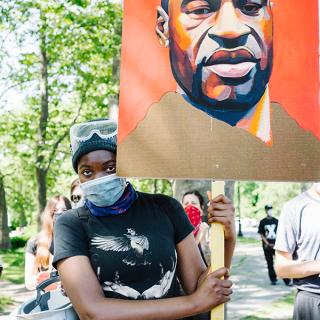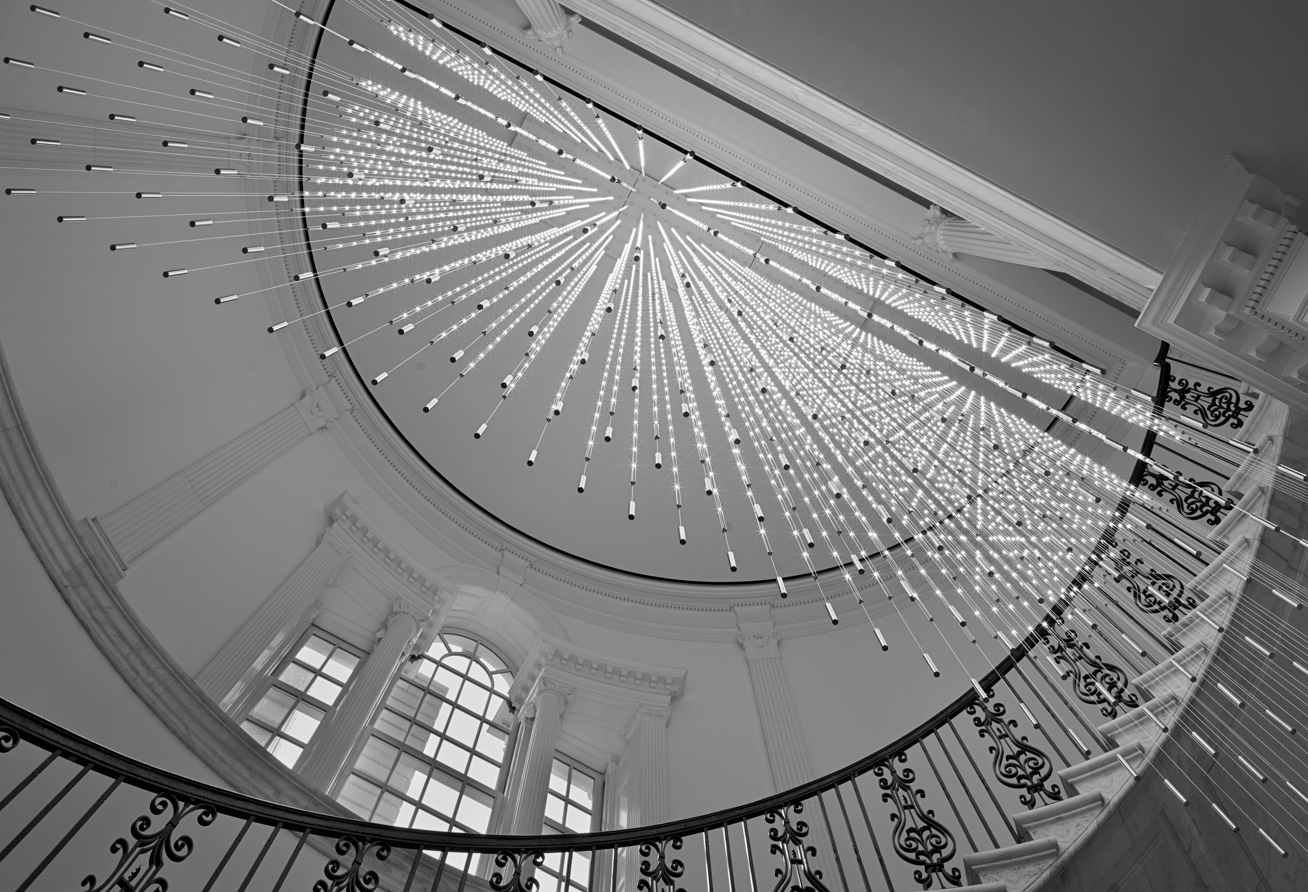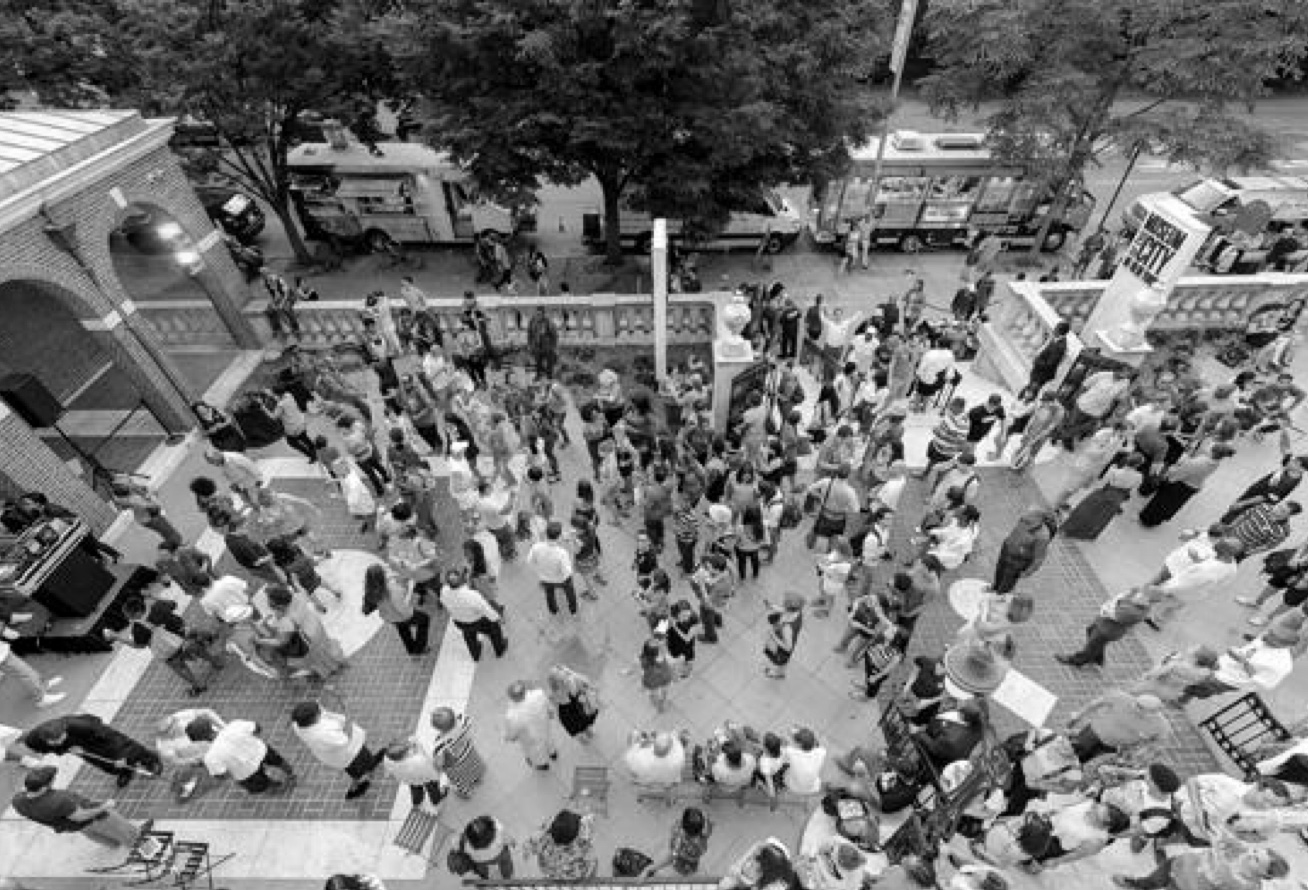#BlackLivesMatter
The Movement for Black Lives
2012-2020
Ongoing

Back to Exhibitions
The 2020 uprisings have brought #BlackLivesMatter back to the center of national conversation. Organized by queer Black women Alicia Garza, Patrisse Cullors, and Opal Tometi, the hashtag first appeared on Twitter in 2013 as a rallying cry to “recognize the humanity of all Black life.”
It has since anchored activism against anti-Black racism in the criminal justice system and beyond. New York activists have been integral to what is known as the Movement for Black Lives (M4BL), a sustained and organized force for change across the country.
The issues raised by M4BL were not new in 2013: Black New Yorkers have protested violent and discriminatory police treatment from Brooklyn in 1925 to “stop-and-frisk” policies introduced in the 1990s. Movement activists have built on this legacy by highlighting problems they see as interconnected: systemic racism, gender discrimination, health hazards, anti-immigrant sentiment, and economic inequality.
In 2020, continued police and vigilante killings of Black people, including George Floyd in Minneapolis, and the COVID-19 pandemic—with its disproportionate impact on marginalized communities in New York and elsewhere—ignited an unprecedented wave of Black-led activism propelled by calls to “defund the police” and reimagine a more just, caring, and equitable society.
Objects & Images
1,000,000 Hoodie March For Trayvon Martin
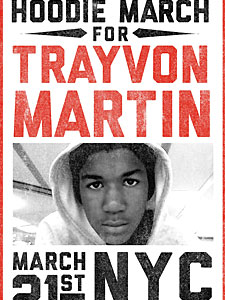
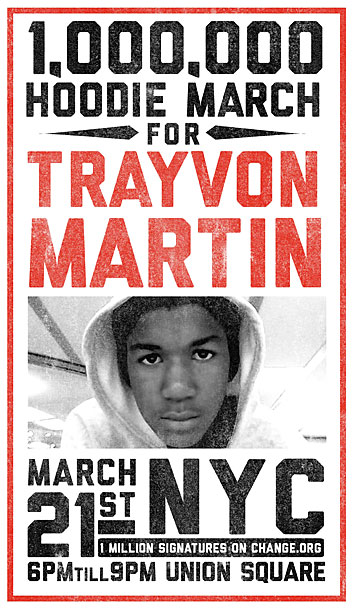
1,000,000 Hoodie March For Trayvon Martin
In 2011 black and Latino New Yorkers comprised approximately half of New York City’s population, but they made up 84 percent of the 685,000 stops made by the New York Police Department and 89 percent of the inmates at the Rikers Island jail complex. After Trayvon Martin’s murder in Florida in 2012, Million Hoodies Movement for Justice launched with protests in Union Square and online calling for the arrest of his shooter, George Zimmerman, and other changes to the criminal justice system. Headquartered in New York, its national mission is “to confront anti-black racism and systemic violence.”
Image Info: 2012, Courtesy Million Hoodies Movement for Justice
“New York Amsterdam News” Newspaper
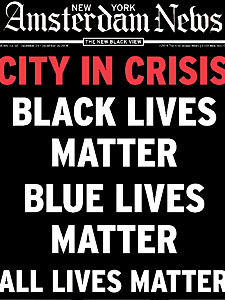
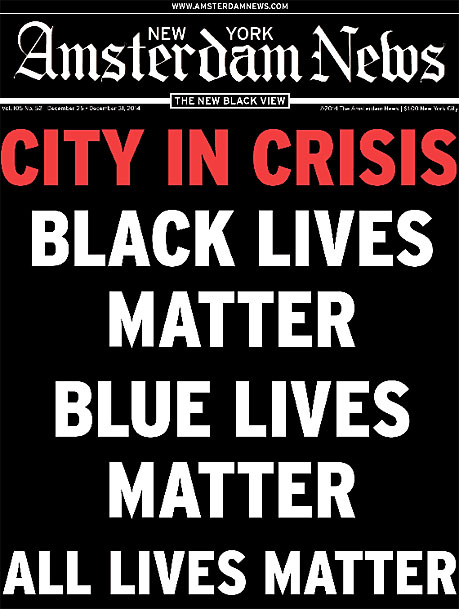
“New York Amsterdam News” Newspaper
The Movement for Black Lives has elicited controversy and sparked difficult conversations. Some critics responded with the phrase “Blue Lives Matter,” pointing to dangers that police officers face, while others suggested the phrase “All Lives Matter.” This edition of the longstanding black newspaper New York Amsterdam News was published after a mentally ill man referenced the deaths of Eric Garner and Michael Brown before fatally shooting two New York police officers. Black Lives Matter activists condemned this violence and defended their phrase by explaining that it seeks not to denigrate others, but to focus on the policies and practices that have disproportionately targeted African Americans.
Image Info: December 25, 2014, Courtesy New York Amsterdam News.
I Can’t Breathe
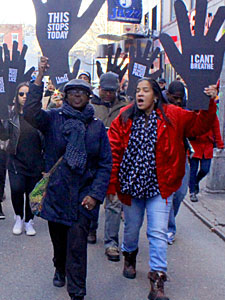
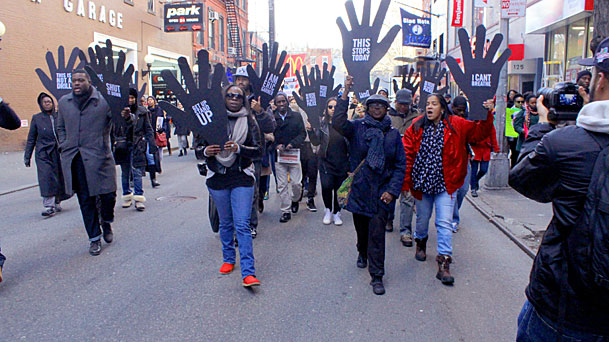
I Can’t Breathe
Eric Garner said “I can’t breathe” 11 times during his fatal confrontation with police on July 17, 2014. Students and teachers at Hostos Community College in the Bronx created “Hostos Hands Up” in response to Garner’s death on Staten Island and Michael Brown’s death in Ferguson, Missouri. They carried hands such as this one, which also reference the chant “Hands up Don’t shoot,” in the Millions March New York City on December 13, 2014. In 2020, George Floyd also pleaded “I can’t breathe” repeatedly before he died.
Hostos Hands Up, 2014, Courtesy Sarah Sandman
“Our Streets Our Bodies Our Voices” Sticker And Postcard
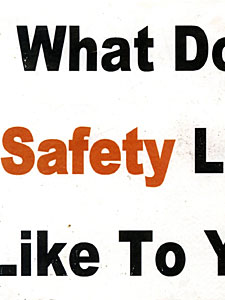
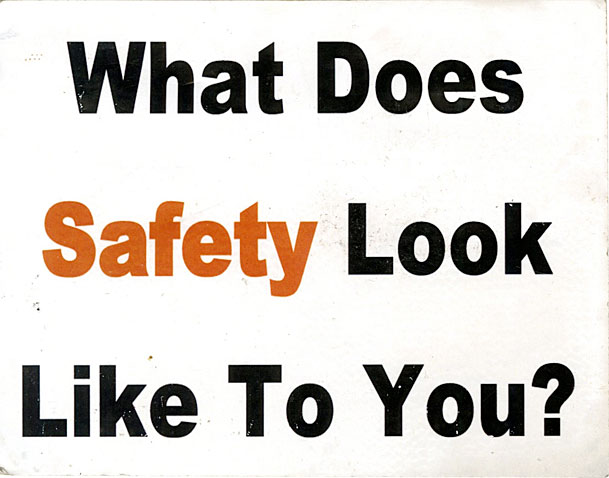
“Our Streets Our Bodies Our Voices” Sticker And Postcard
Groups such as the Black Youth Project 100 (BYP100) and Million Hoodies Movement for Justice have emphasized “the right to be safe.” The New York chapter of BYP100’s campaign, “Our Streets Our Bodies Our Voices,” aimed to create a dialogue about policing and safety in communities across the city, and to include voices, such as those of transgender New Yorkers, that are often left out of such conversations.
Image Info: 2015, Courtesy Black Youth Project 100.
Black Today (when Living Is A Protest Series)
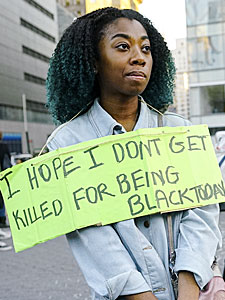
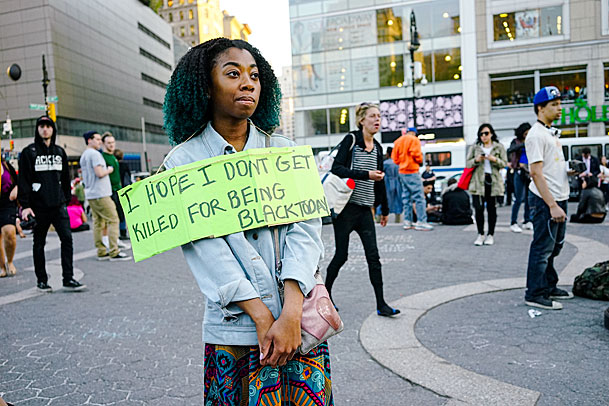
Black Today (when Living Is A Protest Series)
Brooklyn-based photographer Ruddy Roye uses the app Instagram to display his portraits. His series When Living is a Protest evokes the legacy of the black freedom movement and chronicles continuing acts of resistance.
Image Info: Rudy Roye, 2015, Courtesy Ruddy Roye.
Blm Nyc Chapter Logo
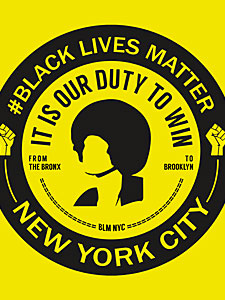
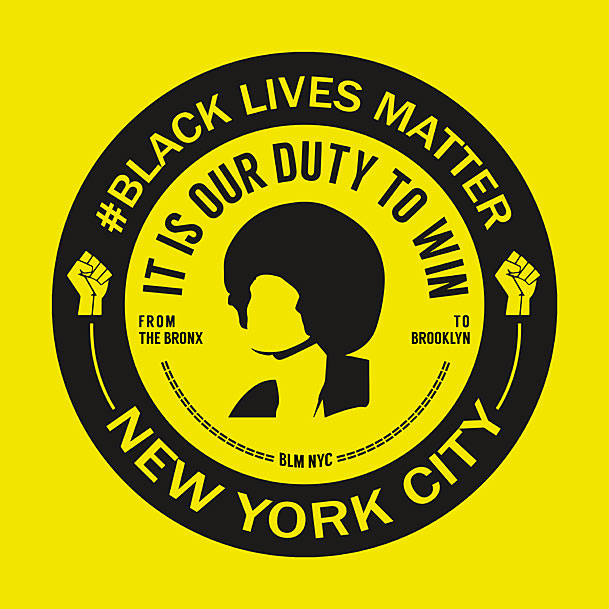
Blm Nyc Chapter Logo
This logo for the New York City chapter of Black Lives Matter references the black liberation movement of the 1960s and 1970s—including the phrase by Assata Shakur, “it is our duty to win,” and the silhouette of a woman that resembles activist-scholar Angela Davis—to connect past civil rights struggles of African Americans against the criminal justice system with those of the present.
Image Info: Walter Cruz, 2016, Courtesy Walter Cruz.
Eric Garner Can’t Vote. But We Can
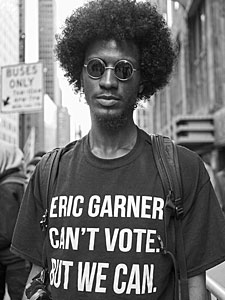
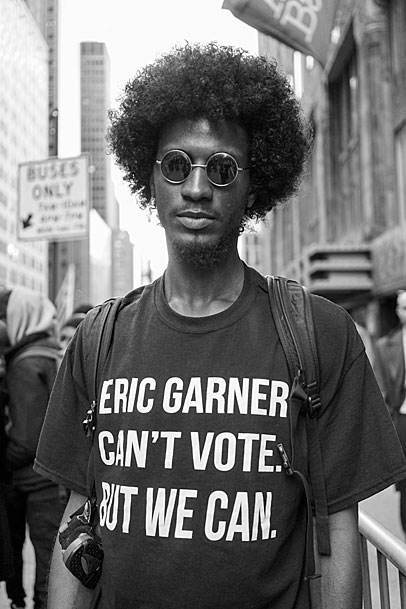
Eric Garner Can’t Vote. But We Can
Participants in the Movement for Black Lives have engaged in local and national electoral politics and demanded Black political power. M4BL has a dedicated Electoral Justice Project and staged a Black National Convention in August 2020 to push its policy platform and galvanize Black voters in the Presidential election of 2020 and beyond.
Image Info: 2016, © Cindy Trinh
Swipe It Forward Flyer
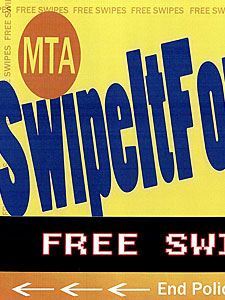
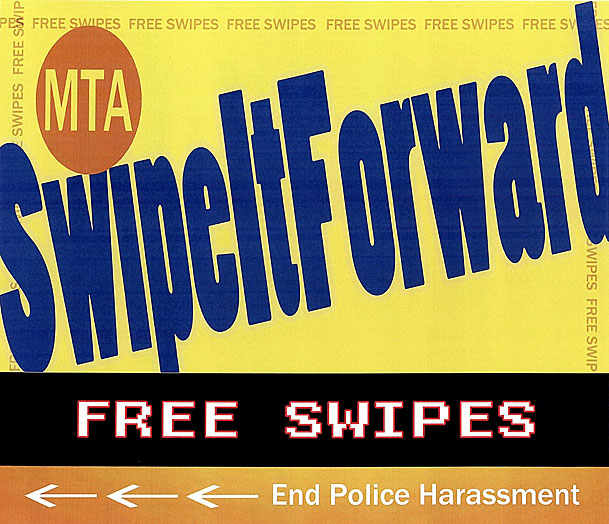
Swipe It Forward Flyer
The connection between racial and economic inequality is highlighted in the Swipe It Forward campaign, which protests subway fare hikes and calls attention to disproportionate police stops of impoverished New Yorkers even as the New York Supreme Court ruled “stop-and-frisk” police tactics as discriminatory and illegal in 2013. The Swipe It Forward campaign has involved a range of groups affiliated with the Movement for Black Lives, such as the Black Alliance for Justice Immigration (BAJI).
Image info: 2016, Courtesy Black Alliance for Just Immigration.
Deborah Danner
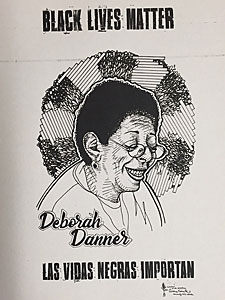
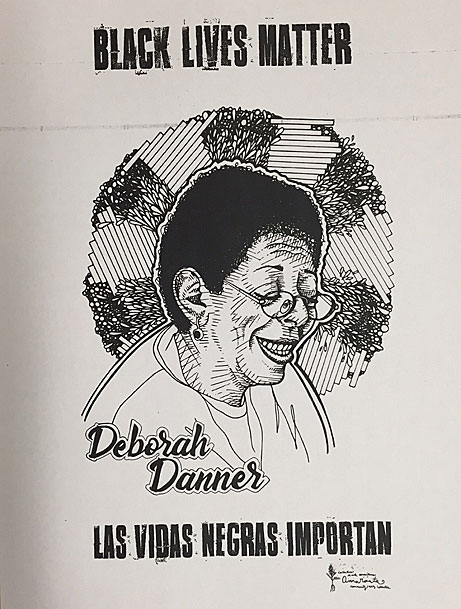
Deborah Danner
On October 18, 2016, New York City police officer Hugh Barry shot and killed 66-year-old Deborah Danner in her home in the Bronx. Danner, who had long struggled with schizophrenia, had wielded scissors and a baseball bat when confronted by police. Her death prompted an outpouring of protest, particularly over the NYPD’s conduct toward mentally ill citizens. This image of Danner forms part of the larger #blmposter project by the New York-based arts collective Colectivo Amaranta.
Image Info: Liliana Conde Sierra/Colectivo Amaranta, 2017, Courtesy Colectivo Amaranta.
Stay Woke, Stay Whole: A Black Activist Healing Manual
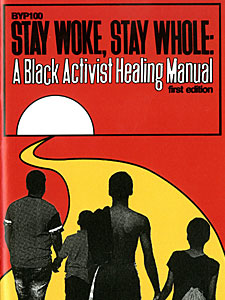
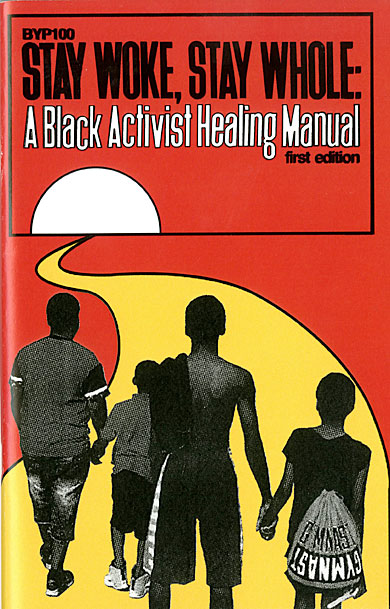
Stay Woke, Stay Whole: A Black Activist Healing Manual
Space for self-care and healing have become central components of the Movement for Black Lives. These initiatives intend not only to create safe spaces and new restorative modes of activism, but also to address the physical stress of racism and the disproportionately poor health outcomes of people of color.
Image Info: Black Youth Project 100, Cover by Fresco Steez, 2017, Courtesy Chris Harris.
George Floyd Sticker
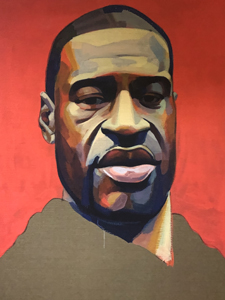
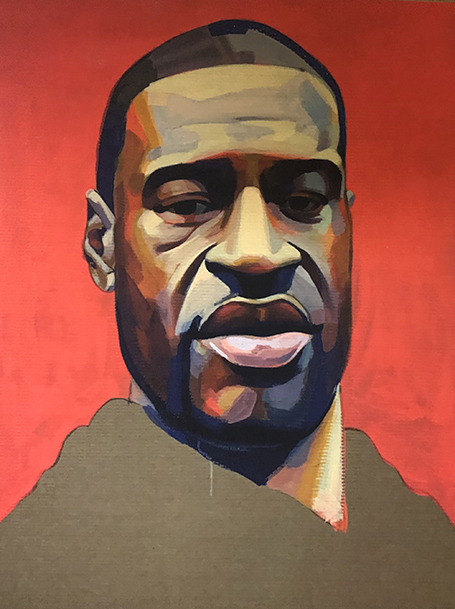
George Floyd Sticker
The May 25, 2020 murder of George Floyd, a 46-year-old Black man, by Derek Chauvin, a white police officer in Minneapolis, Minnesota, sparked widespread outrage and helped ignite a national wave of Black-led protests. Floyd was arrested for allegedly using a counterfeit $20 bill. While detaining Floyd, Chauvin kneeled on Floyd’s neck for eight minutes and 46 seconds, killing him. Witnesses captured the encounter and the video went viral the next day. Floyd’s face has become a symbol of police brutality across the country: this sticker’s image, based on an original painting, has been ubiquitous at New York City protests.
Image info: Artists for George, printed by Shoestring Press, 2020, Courtesy Shoestring Press
Black Trans Live Matter, Brooklyn Museum, June 2020
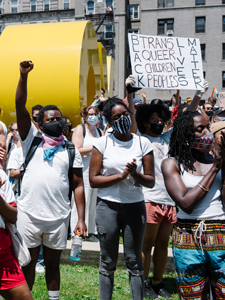
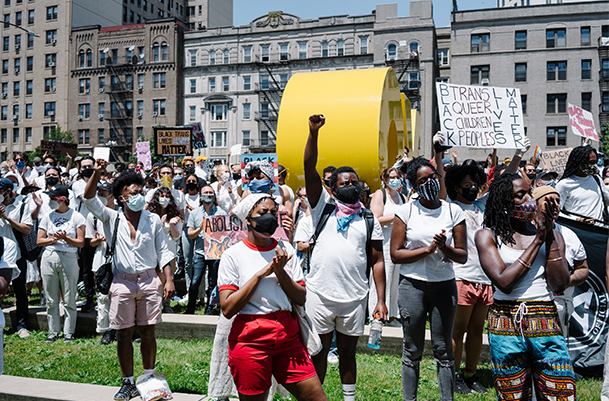
Black Trans Live Matter, Brooklyn Museum, June 2020
Thousands of protesters wearing white gathered at the Brooklyn Museum on June 14, 2020 to take part in a rally and silent march for Black Trans Lives. “Brooklyn Liberation: An Action for Black Trans Lives” was organized by the Okra Project, the Martha P. Johnson Institute, and other Black Trans centered groups in response to the deaths of Layleen Polanco, a Black-Latinx transgender woman who died in solitary confinment while on Rikers Island; Tony McDade, a Black transgender man killed by a police officer in Tallahassee, Florida; and other victims of police violence and transphobia. The large size of the rally reflects growing recognition of M4BL’s call to fight for the safety and betterment of all Black life.
Image Info: June 14, 2020, © Cindy Trinh
Occupy City Hall - Budget Day, Nyc, June 30, 2020
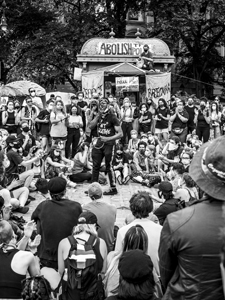
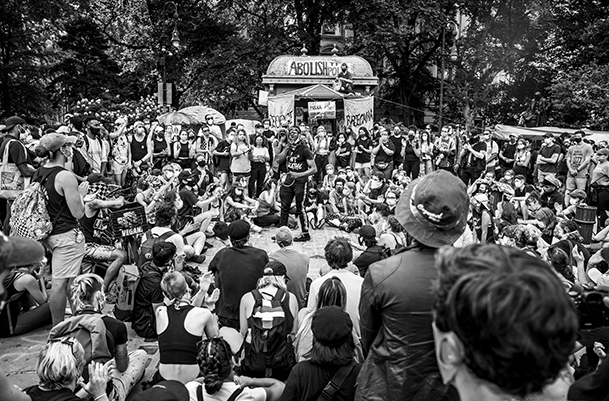
Occupy City Hall - Budget Day, Nyc, June 30, 2020
Activists spent nearly a month camping out at the public space next to New York’s City Hall in June and July 2020. In addition to calling for significant cuts to the NYPD’s budget, protesters engaged in communal living: operating a library and wellness space; creating art and music; and serving food to activists and others in need. Police removed protesters on July 22, 2020. Occupy City Hall’s length and dismantling also evoked Occupy Wall Street, another occupation in Lower Manhattan, in 2011.
Image Info: 2020, © Graham MacIndoe
Key Events
| Global | Year | Local |
|---|---|---|
|
Trayvon Martin is killed in Florida by George Zimmerman |
2012 | |
| The hashtag #BlackLivesMatter emerges | 2013 |
New York State Supreme Court declares “stop-and-frisk” policing by NYPD unconstitutional |
| 2014 |
Eric Garner and Akai Gurley killed in Staten Island and Brooklyn, respectively; Millions March in Manhattan |
|
| 2015 | Kalief Browder commits suicide after a three-year stay at the Rikers Island jail without a trial, prompting increased protests to close Rikers | |
| 2016 | Fifty groups release “A Vision for Black Lives”; BYP100 sit-in at NYPD’s union, the Police Benevolent Association | |
| 2017 | New York M4BL activists protest the Trump administration’s “Muslim Ban”; help lead the Women’s March; and successfully protest to remove the Fifth Avenue statue of Dr. Marion J. Sims, who experimented on bodies of enslaved Black women | |
| 2019 |
New York City Council votes to close Rikers, but provokes controversy by approving rezoning for building four new smaller jails |
